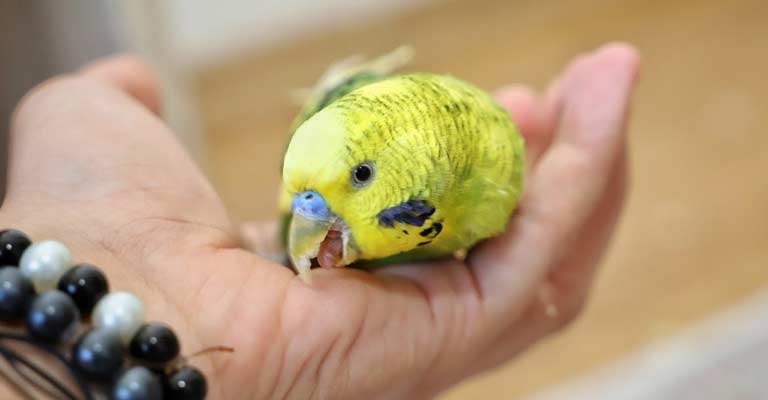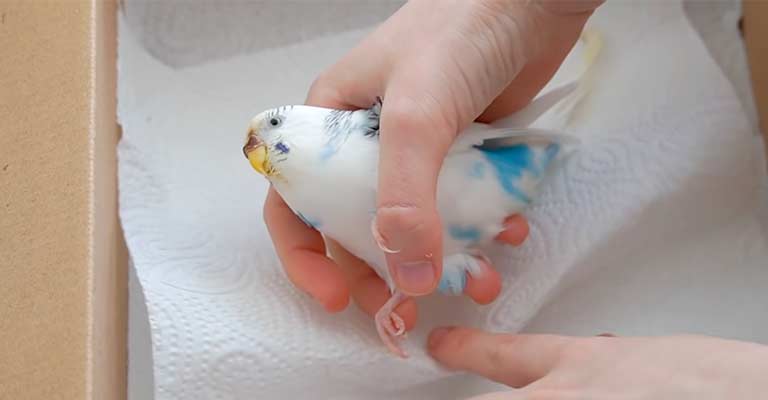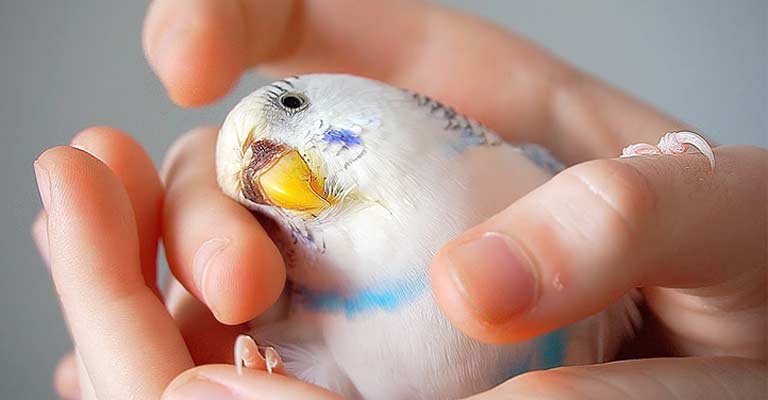As cherished members of our households, parakeets bring joy and vibrant energy to our lives. However, just like any other living creature, these feathered companions are not immune to health challenges.
Among the concerns that can arise, the question of whether a parakeet can suffer from a stroke may not be as well-known. So, can a parakeet have a stroke?
In this exploration, we delve into the avian world to unravel the mysteries surrounding the health of our feathered friends.
From their charming chirps to their playful antics, parakeets captivate us with their lively personalities. Yet, behind those colorful plumages lies the vulnerability that comes with being a living being.
Join us on a journey to understand the potential risks, signs, and care involved when pondering the possibility of strokes in these delightful little birds.
Discover how a closer look at their well-being can deepen the bond between us and our avian companions.

Can a Parakeet Have a Stroke?
While we often associate strokes with humans, the possibility of these neurological events occurring in our feathered friends raises intriguing questions.
In this comprehensive guide, we delve into the world of parakeet health, exploring the potential for strokes, recognizing signs, understanding risks, and providing insights into compassionate care.
Understanding Avian Physiology: A Primer on Parakeet Health
Before delving into the possibility of strokes in parakeets, it’s essential to grasp the basics of avian physiology. Parakeets, like other birds, possess a unique set of characteristics that distinguish them from mammals.
Their circulatory and respiratory systems are intricately adapted to the demands of flight, and their brains, though small, play a crucial role in their behavior and well-being.
Decoding the Enigma: Can Parakeets Suffer Strokes?
The notion of a parakeet experiencing a stroke may seem surprising, but it’s essential to acknowledge that these small birds can encounter health challenges.
Strokes, which occur due to a disruption in blood flow to the brain, can manifest in various species, including birds. While less common in avian companions, strokes in parakeets are not entirely unheard of.
Signs of Stroke in Parakeets: Deciphering the Clues
Recognizing the signs of a stroke in a parakeet requires attentive observation. Sudden changes in behavior, loss of coordination, and difficulty in perching or flying can be indicative of a neurological issue.
Additionally, changes in vocalization, disorientation, and an altered posture may signal distress. Bird owners must be vigilant and seek veterinary attention promptly if any unusual behavior is observed.
Unraveling the Risks: Factors Contributing to Avian Strokes

Understanding the potential risks that contribute to strokes in parakeets is vital for proactive care. High-stress environments, poor nutrition, and underlying health conditions can elevate the likelihood of neurological issues.
A diet lacking essential nutrients, exposure to toxins, or inadequate mental stimulation may also impact a parakeet’s overall health and increase susceptibility to strokes.
Veterinary Insights: Seeking Professional Care for Parakeets
If there’s suspicion of a stroke or neurological issue in a parakeet, prompt veterinary care is paramount.
Avian veterinarians possess the expertise to conduct thorough examinations, diagnostic tests, and imaging studies to determine the nature and extent of the problem.
Early intervention is key to improving the chances of recovery and minimizing potential long-term effects.
Compassionate Care: Nurturing Parakeets Back to Health
Caring for a parakeet recovering from a stroke involves creating a supportive environment. Providing a quiet, stress-free space, ensuring a well-balanced diet, and administering any prescribed medications are crucial components of the recovery process.
Additionally, spending quality time with the bird, offering mental stimulation, and closely monitoring its progress contribute to a holistic approach to rehabilitation.
Preventive Measures: Safeguarding Parakeet Health
Preventing strokes in parakeets involves adopting proactive measures to maintain their overall well-being. A balanced diet rich in vitamins and minerals, a clean and safe living environment, and regular veterinary check-ups contribute to a parakeet’s longevity and resilience.
Minimizing stressors, offering appropriate toys for mental stimulation, and fostering a bond of trust between the owner and the bird are essential elements of preventive care.
The Human-Parakeet Connection: Strengthening the Bond
As responsible caretakers, understanding the intricacies of parakeet health not only aids in recognizing and addressing potential issues but also deepens the bond between humans and their avian companions.
The commitment to providing optimal care ensures that parakeets can continue to enchant households with their lively personalities and vibrant presence.
What Causes a Stroke in Parakeets?

A stroke in parakeets, also known as a cerebrovascular accident (CVA), can be caused by various factors, and understanding them is crucial for bird owners to provide proper care. Here’s a detailed explanation of the common causes of strokes in parakeets.
Aging
As with humans, aging is a significant factor in the development of strokes in parakeets. Older birds may experience a decline in overall health, including weakened blood vessels and reduced cardiovascular function, making them more susceptible to strokes.
Poor Diet
A nutritionally inadequate diet can contribute to the development of strokes in parakeets. Diets lacking essential vitamins, minerals, and nutrients can lead to cardiovascular issues, such as atherosclerosis (hardening of the arteries), which increases the risk of strokes.
High-Fat Diets
Excessive consumption of high-fat foods can lead to the accumulation of fatty deposits in the blood vessels, causing blockages that may result in a stroke. It’s important for bird owners to provide a balanced and low-fat diet to prevent such complications.
Hypertension
Elevated blood pressure is a significant risk factor for strokes in both humans and parakeets. Hypertension can damage the delicate blood vessels in the bird’s brain, leading to hemorrhagic strokes (caused by bleeding in the brain) or ischemic strokes (caused by a lack of blood flow).
Cardiovascular Diseases
Pre-existing heart conditions or cardiovascular diseases can increase the likelihood of strokes in parakeets. Conditions like heart murmurs or valve disorders can disrupt normal blood flow, potentially leading to blood clots and strokes.
Genetic Predisposition
Some parakeets may have a genetic predisposition to certain health conditions, including those affecting the cardiovascular system. Responsible breeding practices and regular veterinary check-ups can help identify and address genetic factors that may contribute to strokes.
Infections
Certain infections, especially those affecting the circulatory system or causing inflammation, can indirectly contribute to strokes in parakeets. Timely diagnosis and treatment of infections are essential to prevent complications.
Trauma

Physical injuries or trauma to the head and neck region can damage blood vessels, leading to strokes. Bird owners should take precautions to create a safe environment for their parakeets, minimizing the risk of accidents.
Environmental Factors
Poor living conditions, exposure to toxins, or stressful environments can negatively impact a parakeet’s overall health, increasing the likelihood of strokes. Maintaining a clean and safe living space is crucial for preventing various health issues.
Dehydration
Inadequate water intake can lead to dehydration, affecting blood viscosity and circulation. Dehydrated parakeets are at a higher risk of developing clots and experiencing strokes.
Obesity
Overweight parakeets may face an increased risk of stroke due to the strain excess weight puts on the cardiovascular system. Maintaining a healthy weight through proper diet and exercise is essential.
Toxic Exposures
Exposure to toxic substances like certain household cleaners, fumes, or plants can lead to neurological damage in parakeets, increasing the risk of strokes.
Bird owners should be vigilant about potential hazards and ensure their pets are kept in a safe environment free from harmful substances.
Endocrine Disorders
Disorders affecting the endocrine system, such as thyroid imbalances, can disrupt the parakeet’s hormonal regulation and contribute to cardiovascular issues, potentially leading to strokes. Regular veterinary monitoring can help detect and manage endocrine disorders promptly.
Lack of Exercise
Sedentary lifestyles can contribute to poor circulation and cardiovascular issues. Providing opportunities for physical activity and mental stimulation is vital for preventing strokes in parakeets.
Preventing strokes in parakeets involves a combination of factors, including a well-balanced diet, regular veterinary check-ups, a safe living environment, and attention to the bird’s overall health.
Bird owners should be proactive in promoting a healthy lifestyle for their feathered companions to minimize the risk of strokes and ensure a longer, happier life.
FAQs
Can Stress Cause Strokes in Parakeets?
Stress is a significant factor that can contribute to health issues in parakeets, including strokes. High-stress environments may elevate cortisol levels, impacting the bird’s overall well-being.
Minimizing stressors, providing a secure living space, and maintaining a consistent routine are crucial in preventing undue stress and potential health complications.
What Dietary Changes Can Help Prevent Strokes in Parakeets?
Ensuring a well-balanced diet is essential for preventing strokes in parakeets. A diet rich in vitamins, minerals, and nutrients, including fresh fruits, vegetables, and high-quality pellets, supports overall avian health.
How Do I Recognize Normal Behavior vs. Signs of a Stroke in My Parakeet?
Understanding normal parakeet behavior is crucial for identifying potential signs of a stroke. Changes such as sudden loss of coordination, altered vocalization, and disorientation may indicate neurological issues.
Can Older Parakeets Be More Prone to Strokes?
Like many species, aging can bring about health challenges in parakeets, potentially making them more susceptible to strokes. As parakeets age, it becomes increasingly important to monitor their health, maintain a proper diet, and schedule regular check-ups with an avian veterinarian.
Is There Rehabilitation for Parakeets That Have Experienced Strokes?
Rehabilitation for parakeets recovering from strokes involves creating a supportive environment. Alongside prescribed medications, providing mental stimulation, a quiet space, and a nutritious diet contribute to their recovery.
Conclusion
In the realm of avian health, the well-being of our parakeet companions becomes a paramount concern.
While the notion of a parakeet experiencing a stroke may seem surprising, it’s crucial to recognize that these vibrant birds, like any living being, are not exempt from health challenges.
Through our exploration, we’ve gained insight into the potential risks, subtle signs, and compassionate care that can make a significant difference in a parakeet’s life.
As responsible caretakers, being attuned to the needs of our feathered friends allows us to provide them with the love and attention they deserve.
By understanding the vulnerabilities they may face, we strengthen the bond that exists between us and these delightful creatures.
In the world of parakeets, knowledge and compassion go hand in hand, ensuring that our avian companions lead happy, healthy lives, surrounded by the warmth of our care and concern.